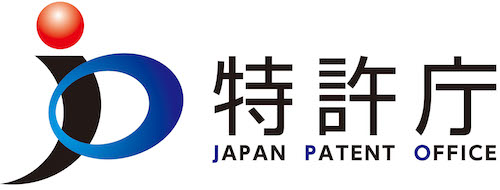IP BASE English Page
Interview with German Bionic CEO, Mr. Armin Schmidt
重量物の持ち上げ作業での腰の負担を軽減するパワースーツを開発するGerman Bionic/German Bionic Develops Power Suits Reducing Back Strain in Heavy Lifting
German Bionic 社は、ドイツで2016年に創業されたロボティクススタートアップ。物流や建設現場で重量物を運ぶ労働者の腰の筋肉への負担を軽減するための次世代エクソスケルトン・パワースーツ「Cray X」を開発。2018年には日本法人としてGBS株式会社を設立し、Cray Xは国内の多くの物流現場で導入されている。同社CEO兼共同創設者のアーミン・シュミット氏に起業の経緯や資金調達と知財活動のポイントを伺った。
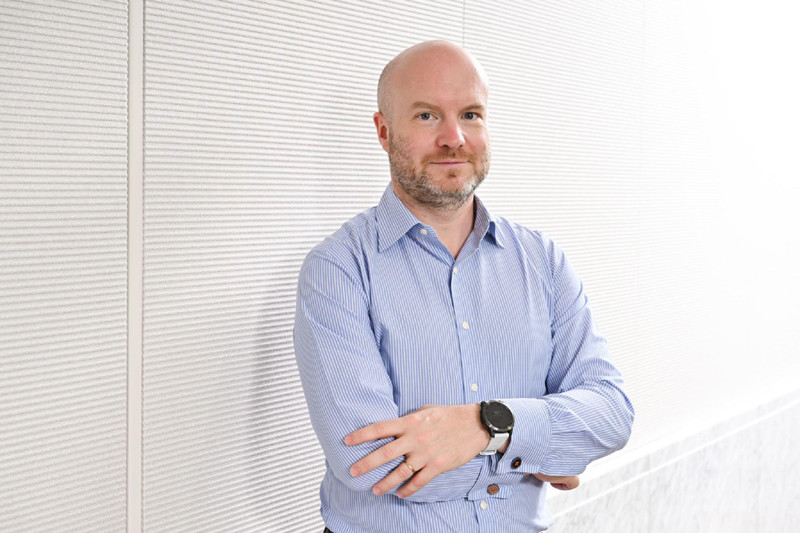
German Bionic CEOアーミン・シュミット(Armin Schmidt)氏
連続起業家として、German Bionic創業以前には、ストリーミングサービスのAupeoと自動車用ソフトウェアプラットフォームのAdvanced Telematic Systems (ATS)を設立。Aupeoはパナソニックに売却し、ATSはHERE Technologiesに買収された。German Bionicでは共同設立者兼CEOとして、ロボット型外骨格や安全分析技術など、先進的でスマートなウェアラブルツールの開発を統括する。
エクソスケルトン業界をリードするGerman Bionic
外骨格(Exoskeleton)技術を活用した産業向けパワースーツ「Cray X」を開発・販売する、German Bionic社。2016年に独アウグスブルグで創業し、米ボストンと東京に販売拠点を開設する同社は、物流業界を主なターゲットにグローバル展開する。
Cray Xは、荷物の上げ下ろし動作を補助するパワースーツだ。約7.4kgの超軽量カーボンファイバーで作られた本体部分をバックパックのように背負い、胸と腰、太ももに固定ベルトを締めて装着する。腰を曲げて床の荷物を持ち上げようとすると、その動作に反応して腰部分のモーターが回転し、背筋が伸びた状態へと姿勢を戻す。バッテリー充填式で、バネの反発力を利用して姿勢を引き上げるタイプとは異なり、反発時に生じるエネルギーを身体のどこかで逃がす必要がないことから、同社調査では腰への負担が64%軽減可能だ。
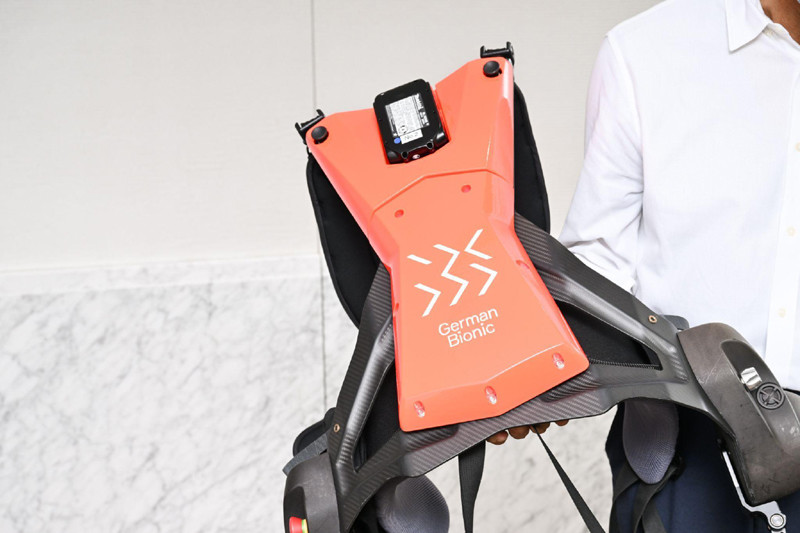
物流センターの倉庫で注文の品をピッキングする、トラックやコンテナに荷物を積み込む/下ろす、段ボールを仕分けるといった、重い荷物を繰り返し上げ下げする作業に最適で、BMWやIKEA、ビックカメラなどで導入されている。
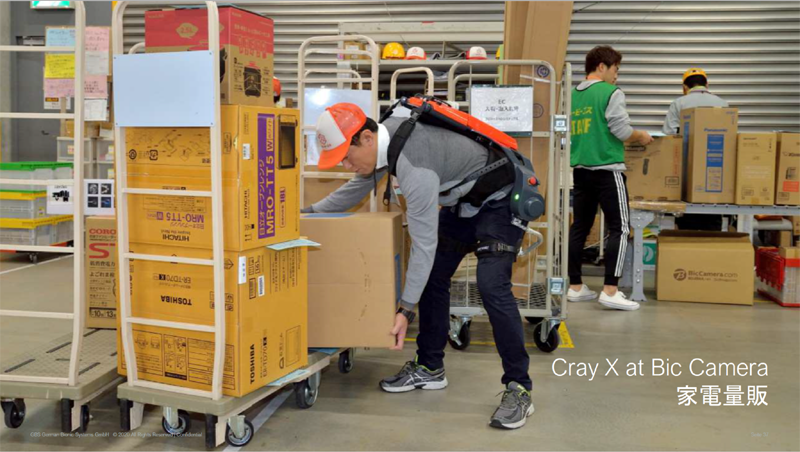
Cray Xの特長のひとつは、本体センサーで利用者の状態をリアルタイムに監視し、リモートで運用管理者向けダッシュボードへフィードバックする機能だ。歩数や持ち上げ回数など各種計測データは、利用者別の歩行支援設定だけでなく、利用者が危険な姿勢で作業しているかどうかを判断する情報としても活用され、リスクがある場合は自動警告が本体から表示される。
利用者はPIN番号で登録・管理し、同じCray Xを複数ユーザーで兼用することも可能だ。Cray Xを初めて装着すると自動キャリブレーションが行われ、姿勢や歩幅、歩き方などを1~2秒ほどで学習する。その後も装着のたびに利用者の状態を学習して操作感を微調整する。利用者ごとの普段の動きから疲労レベルを判定し、休息が必要な場合に通知する機能もある。
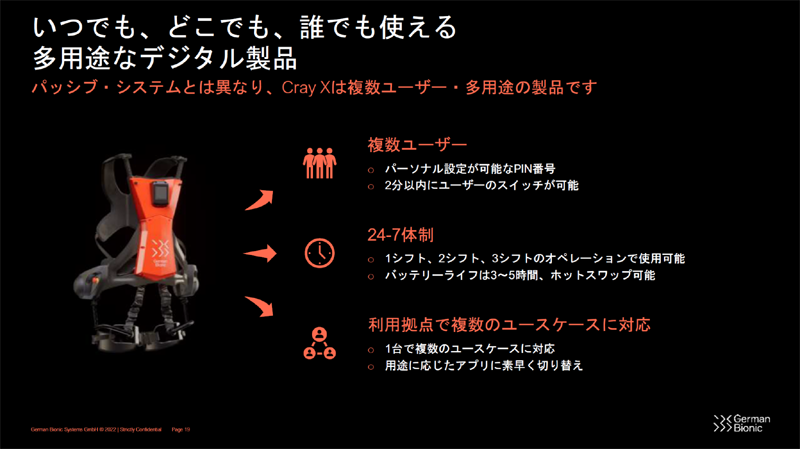
2023年1月に米国ラスベガスで開催されたCES 2023では、より安全な職場環境に向けてAI搭載の次世代パワースーツ「Apogee(アポジー)」と「スマート・セーフティベスト」を発表。Apogeeは、「Cray X」から大幅に軽量化され、汎用性が向上。「スマート・セーフティベスト」は、センサーとAI技術を取り入れ、人間工学に基づいた測定と改善アドバイスを表示することで、あらゆる職種での仕事上の疲労やケガを軽減できる。
ソフトウェア出自のエンジニアがロボット業界に転身
「人間を機械に置き換えたり、空飛ぶアイアンマンのようなスーパーヒューマンを作ったりしたいわけではない」。創業者で同社CEOのアーミン・シュミット(Armin Schmidt)氏は、まじめな表情で語る。
「過酷な環境下で1日8時間以上、重い荷物を運び続ける人たちがいる。完全自動化された産業用ロボットを使う方が良い場面がある一方で、とっさの判断ができる人間を必要とする場面も多くある。そうした人たちの健康を守りたい。『重労働から帰宅したあとも子供たちと遊ぶことができた』とユーザーから喜ばれたときは報われた気持ちになった」と同氏は言う。
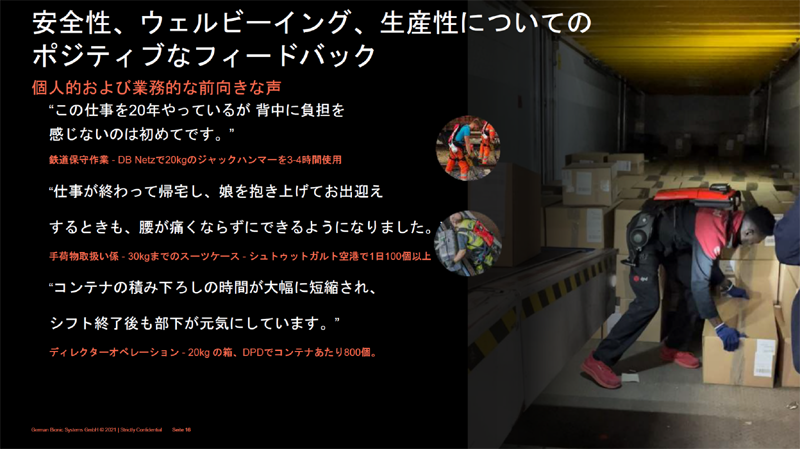
シュミット氏はもともとソフトウェア業界に身を置いていた。以前は、音楽ストリーミングサービスを提供するAUPEO!を2007年に創業。車載インフォエンタテインメントシステムのOEMとして広く実装されるなか、2013年にパナソニックが買収。その後、コネクテッドカーのファームウェアOTA配信サービスを提供するAdvanced Telematic Systemsを起業し、2017年にエグジットしたのち、ハードウェアの世界に足を踏み入れた。
きっかけは、ロボット業界にいた従兄弟に声をかけられたことだった。プロトタイプを見て好感触を得たシュミット氏は、新しい業界での挑戦を決めた。シュミット氏のOTA分野における経験と実績は、機能のアップデートやバグ/脆弱性の修正などが必須事項であるIoT領域で強みとなった。
もっとも、起業当時はVCのロボティクス系スタートアップへの関心が非常に低く、投資対象と見られずに苦労した、とシュミット氏は振り返る。開発コストと価格設定のバランスが釣り合うようになり、無理なく市場展開できるようになったのはここ数年の話。同社の考えに未来を感じて支援してくれた仲間やVCがいたから、ここまでやって来られたと話す。
「起業のタイミングを見極めるのは難しい。時代を先取りしすぎても売れないし、遅すぎてもダメだ。特にエクソスケルトン技術はハードウェア開発に時間がかかる。たとえ大企業で研究資金に余裕があっても、簡単に模倣できない。苦労はしたが、市場が盛り上がるタイミングに製品展開できたので、判断は間違ってなかった」とシュミット氏は述べている。
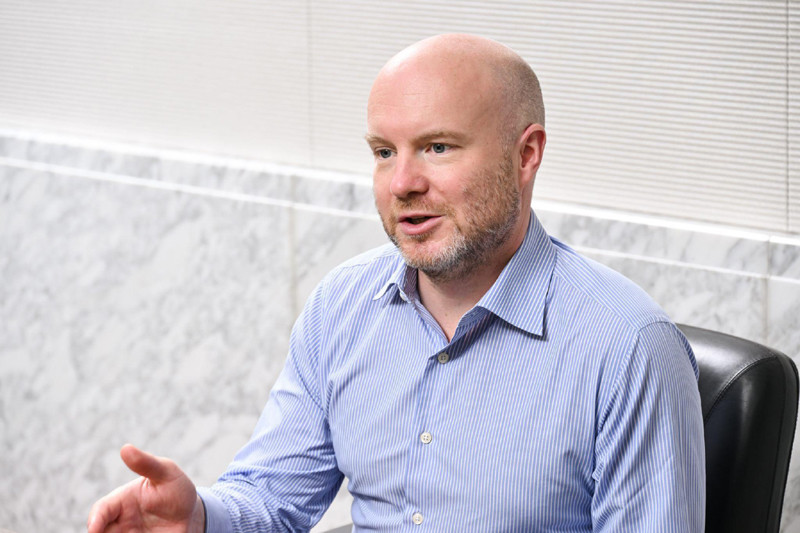
資金調達と特許保護の大切さ
起業するにあたり、タイミングを見定めること以外にも大切なことがあるとシュミット氏は言う。
1つは、資金調達だ。「事業に失敗しても次へのステップアップになるので問題ないが、資金が尽きたらそこで終わり。その意味で、投資家やVCとの付き合いは大切だ。スタートアップコミュニティの仲間に、自分たちが起業する分野で投資経験のあるVCはいないか、気になる投資家の評判はどうかなど聞くのもいい」(シュミット氏)
同氏はこれまでの経験から、投資家は大きく3つの観点でスタートアップを評価していると分析する。世の中を良くするために取り組んでいること。課題解決に向かって真摯に取り組んでいること。そして、課題を解決する能力をもったメンバーが揃っていることだ。
「ピッチデッキにエグジット戦略について書かれたスライドを1枚でも入れるような、最初から金儲けだけを考えているスタートアップは、そもそも起業すべきではない。投資家も、投資した分を回収したいと考えてはいるが、そんなピッチデッキは間違いなくゴミ箱行きだ。重要なのは、課題を解決して社会に貢献するという信念や想い。実際に成功している人を見ると、頭脳明晰で専門性が高く、解決したい課題に真剣に取り組んでいる」(シュミット氏)
もう1つの大切なことは、特許で資産を守ることだ。German Bionicは、ロボティクス関連で経験豊富な大手弁護士事務所と契約。エクソスケルトン技術関連の実用特許を含めて複数の特許を出願している。
「知的財産権は、事業の自由度を保証するものだ。R&Dチームにはインセンティブ制度を導入しており、彼らの努力をしっかり保護することも重要な事業戦略のひとつ」(シュミット氏)
だが、出願と維持費用にはそれなりのコストがかかる。スタートアップからすれば高額な投資になる。申請した内容も出願から一定期間後に公開されることも考慮すべきだ。同社の場合、どこよりも早く製品開発することが最優先課題だったので、起業から2年間は出願しなかったという。シュミット氏は「いつ、どの段階で出願するかは戦略的に考えるべき」と助言する。
パワースーツを当たり前のように着こなす未来へ
「日本はドイツと同じく、新しいテクノロジーに対して保守的なので参入の難易度は高い。でも、ロボティクスや機械工学に関する専門性は他国と比べて理解が深く、Cray Xで使用する部品の一部に日本のメーカーのものを採用している。何よりも、ロボット好きが多い」。日本市場について質問したところ、シュミット氏はこう笑いながら答え、来日時にCray Xが入ったケースを開けた入国審査官がみんな笑顔になったエピソードを紹介。市場規模としてはアメリカの方が大きく、2022年はロボティクス市場が急成長する同国のボストンに拠点を置いて事業拡大に集中してきたが、日本は同等に重要な市場であり、今後も注力していくとした。
街に出てあたりを見回すと、荷物運搬や歩行補助などさまざまなシーンでパワースーツが当たり前のように活用されている。シュミット氏が思い描く10年後、20年後の未来は、そんな世界だ。「これからも多くのパートナーとともにエクソスケルトン業界を盛り上げていきたい」と語った。
最後に、日本のスタートアップに向けてシュミット氏は次のメッセージを贈る。
「スタートアップは、山ほどのトラブルや失敗を経験することになる。特に起業して1、2年目は、創業者同士が仲間割れした、興味がそがれて主要メンバーが離職したなど、さまざまなトラブルが起きやすい。何度もピボットして迷走することもあるだろう。でも、それは当たり前のことだ。成功した多くのスタートアップはこうした痛みを乗り越えてきた。だからこそ、ベンチャー仲間でも投資家でもいいので、良いアドバイスをくれる人をぜひ見つけてほしい。私もそうだが、創業者はつい、専門領域に関しては何でも知っている “つもり”になってしまい、他人の声を遮断しがちだ。でも、それは間違いだ。アドバイスには謙虚に耳を傾けてほしい。そうすれば、失敗やリスクを回避するための適切な判断ができるようになる」(シュミット氏)
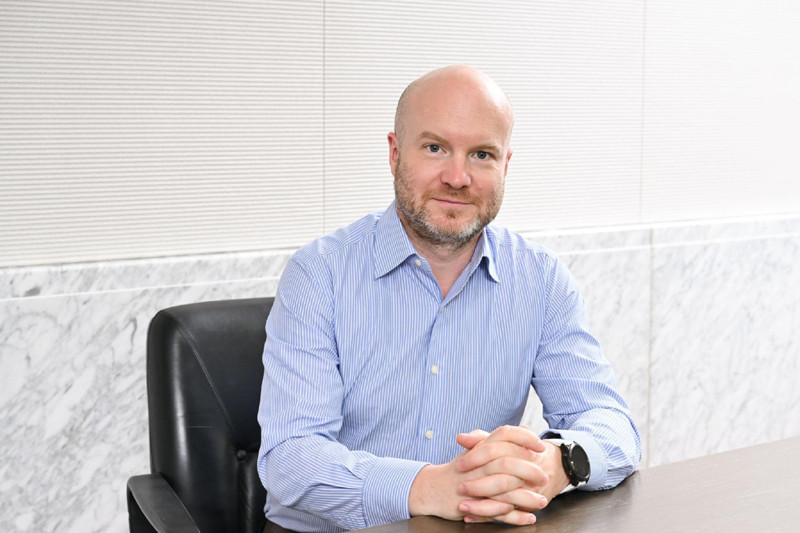
文●谷崎朋子 編集●ASCII STARTUP 撮影●曽根田元
German Bionic is a German robotics startup company founded in 2016. They developed ‘Cray X,’ an exoskeleton designed to reduce strain on the lower back muscles of workers carrying heavy loads in construction sites and logistics. In 2018, GBS K.K. was formed, a Japanese-based subsidiary, with Cray X being introduced to a number of logistics sites across Japan. We met with Armin Schmidt, the company's CEO and co-founder, to discuss starting a business, fundraising, and related intellectual property activities.

German Bionic CEO Mr. Armin Schmidt
Armin Schmidt is a serial entrepreneur, before founding German Bionic, he founded and led the streaming service, Aupeo, and the automotive software platform Advanced Telematic Systems (ATS). Aupeo was sold to Panasonic, and ATS was acquired by HERE Technologies, where Schmidt served as a Senior Director prior to founding German Bionic. He oversees the development of forward-looking, smart wearable tools, including robotic exoskeletons and safety analysis technologies.
German Bionic - Leading the Exoskeleton Industry
German Bionic develops and sells CrayX, an industrial power suit utilizing exoskeleton technology. The company, founded in Augsburg Germany in 2016, has sales offices in Boston, USA, and Tokyo, Japan, with plans to expand globally and mainly target the logistics industry.
Cray X, the power suit that assists in lifting and lowering heavy loads. Weighing approximately 7.4kg and constructed from carbon fiber, the suit is worn like a backpack and straps around the chest, waist, and thighs with fastening belts. Bending to pick up an object causes motors positioned at the waist to respond to the motion of your body and return your stance to an upright position. Powered by batteries, the device is unlike others that utilize a form of repulsive force, where energy is distributed to the user. As a result, the company boasts a reduction in the burden on the lower back by approximately 64%.

The device is ideal for environments such as order picking at warehouses for logistics centers, truck, and container loading/unloading, cardboard box sorting, or other situations requiring repeated lifting and lowering of heavy loads. Places such as BMW, IKEA, and Bic Camera have integrated the device into their supply chain.

Cray X has one strength in particular, through sensors on the main body of the device, it can give real-time data on the status of the user which gives feedback to a dashboard and can be accessed remotely by an operations manager. Step counts, the number of lifts, and a variety of other data points can be used to not only give user-specific support settings in walking, but also indicate if there are any dangerous actions, such as incorrect posture, and if there is a risk, automatically display a warning message from the unit.
Registering and administration of a Cray X unit is done by the user, with one Cray X unit having support for multiple users. When putting on the Cray X for the first time, an automatic calibration is conducted, where the device begins learning the user’s posture, gait, and walking style. Even upon subsequent uses, the device continues to learn more about the wearer’s condition and fine-tunes how the operation feels. In addition, the device also can analyze and detect when the user is showing symptoms of fatigue, at which time the device notifies the wearer and encourages rest when necessary.

At CES 2023, held in America at Las Vegas in January 2023, German Bionic announced the next-generation power suit for safer work environments, “the Apogee” and the “Smart SafetyVest.” Apogee is significantly lighter than the Cray X and features improved versatility. The Smart SafetyVest combines sensors and AI technology to take ergonomic measurements and provide feedback to remedy and mitigate work-related fatigue and injuries in a wide variety of occupations.
Engineer Born in Software Turns to the Robotics Industry
“We don't want to replace humans, we want to support humans. We don't want to create superhumans or make Iron Man.” Armin Schmidt, CEO of German Bionic, opens with a serious expression.
“While there are situations where it is better to use completely automated industrial robots, there are a lot of use cases where you need a human as humans are quite smart and even more powerful. There are harsh environments where some individuals have to carry heavy loads for more than eight hours a day. We want to protect the health of these workers. It’s impressive to hear from users, ‘I have been able to play with my kids even after a day of heavy labor’” Mr. Schmidt stated.

Mr. Schmidt originally started in the software industry. Previously he founded the music streaming service, AUPEO! in 2007. The company, widely implemented into an OEM for vehicle info-entertainment systems, was acquired by Panasonic in 2013. From there, he started Advanced Telematic Systems, a firmware OTA delivery service for connected cars, before exiting in 2017 to step into the world of hardware.
The catalyst for this pivot was being approached by his cousin who was in the robotics industry. After taking a look at a prototype and getting a good feel for it, Schmidt decided to take on this new venture in a new industry. Thanks to his experience in the OTA field, he had an advantage in the IoT space where frequent feature updates and bug/vulnerability fixing are a must.
However, Schmidt recalls that as he started the company, the interest in robotics startup companies by VCs was low at the time, making it hard to attract investment. Balancing costs and pricing has stabilized in the last few years, meaning it is only recently that they have been able to develop the market without difficulty. Schmidt states that it is only thanks to a few friends and VCs who saw the company's ideas and potential for the future, that they were able to make it this far.
“Finding the right time to start a company is hard. You can’t be too far ahead of your time, or too late. In particular, exoskeleton technology takes a lot of time in hardware development. Even if a large corporation has the research funding, it’s not an easy task to imitate it. It was very difficult, but we were able to roll out our product at a time when the market was booming, it was the right call.” Mr. Schmidt remarked.

The Importance of Financing and Patent Protection
When starting a new business, Schmidt states that it is not only timing that you have to hold as important.
One thing is financing. “Even if a business fails, it doesn’t matter - you have to move on to the next step. When the money stops, you stop. In this sense, it’s important to get to know investors and VCs. It’s a good idea to consult with other members of the startup community and ask them if they know any worthwhile VCs with good investment experience, or what an investor's reputation is like.” ~ Mr. Schmidt.
Through his own experience, he concludes that investors take three factors into consideration when evaluating a startup. How will it make the world a better place? Is it a sincere effort to solve some kind of problem? Finally, are the people involved capable of solving these problems?
”Startups that think only about money are doing it wrong and shouldn’t be starting a company in the first places, they even include their exit strategy in their pitch deck. Investors, of course, want to recoup their investment, but these kinds of pitch decks are definitely going in the trash. What is important is the belief and desire to contribute to society by solving some kind of issue. If you look at people who are successful, they are smart, professional, and are serious about whatever issue they hope to solve.” ~ Mr. Schmidt.
Another thing that is very important is the protection of assets with patents. German Bionic has a contract with a leading law firm specializing in robotics. They have applied for several patents, including a utility patent related to exoskeleton technology.
“Intellectual property rights are essentially a guarantee of business freedom. The R&D team has an incentive system in place and it is a key business strategy of ours to make sure their efforts are protected. ”
However, filing and maintenance have their own associated costs. For a startup, this is a substantial investment. It is also important to take into consideration that the contents of any application will be made public after a period of time following filing. In German Bionic’s case, their top priority was to develop products faster than anyone else. As a result, they did not file any applications for two years after starting the company. Mr. Schmidt advises being “strategic as to when and at what stage you decide to file.”
Towards a Future Where Power Suits are the Norm
“I think Japan is very similar to Germany. Germany and Japan are very conservative. New technologies are rather difficult to be adopted. Although, Japan does tend to have a good understanding of robotics as a whole. Many of the components used in Cray X are, in fact, supplied by Japanese manufacturers. Above all, they love robots.”
When asked about the Japanese market, Mr. Schmidt laughed during his answer. He recalled coming to the country with Cray X in his luggage, the immigration officers were all ‘very excited’. While the US is the larger market, where the company is located in Boston and has concentrated on expansion throughout 2022, Japan continues to be an equally important market and will continue to be a prime focus of the company.
When you go out on the street, you will see power suits carrying out a wide manner of activities in a number of situations, such as luggage carrying or walking assistance. Schmidt envisions this world to be a reality in the future, in ten or twenty years. He added, “I hope to make the world of exoskeletons more remarkable with our many partners.”
Finally, Mr. Schmidt offers a message to the entrepreneurs of Japan.
“Startups encounter a mountain of troubles. In particular, I think the biggest risk is in the first one or two years. Founders fall out with each other, or other key members leave the company due to lack of interest. The company itself also may also pivot from the original idea many times, with each time being very painful. That’s to be expected, however. Successful startups are able to ride out these growing pains. That’s why I urge everyone to seek out someone who can offer good advice, be it a VC or an investor. I was the same, as are most founders, we tend to drown out the voices of others because we think we know best in our field of expertise. That is a huge mistake. Listen to advice with humility, then you can make the right decisions with minimal mistakes and risks. ”

Writer: Tanizaki Tomoko, Editing: ASCII Startup, Provided images: German Bionic Systems GmbH
